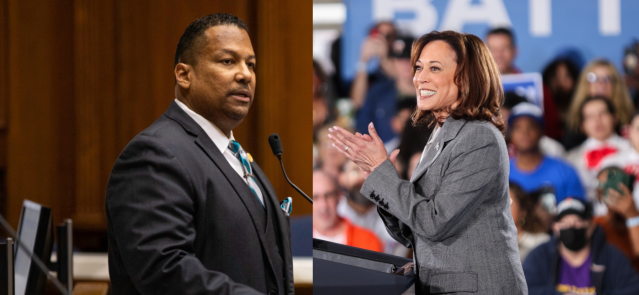Stay ahead of the curve as a political insider with deep policy analysis, daily briefings and policy-shaping tools.
Request a Demo
School classrooms in Indiana. (Credit: Gary Community School Corporation/Jeff Morehead)
Six candidates are seeking the Republican nomination for Indiana governor in the May 7 primary. State Affairs is providing looks at their stances on several issues. Jennifer McCormick is unopposed for the Democratic nomination. Donald Rainwater is the Libertarian candidate.
Republican gubernatorial candidates have outlined their plans for education, a topic that has received less attention than others during debates even though education funding accounts for more than half of the state’s budget when including higher education.
Lt. Gov. Suzanne Crouch and former Attorney General Curtis Hill want to shrink the Indiana Department of Education. Meanwhile, U.S. Sen. Mike Braun has said more money needs to go to the classroom, and former Secretaries of Commerce Brad Chambers and Eric Doden eye better teacher pay.
A sixth candidate, Jamie Reitenour, believes Indiana’s education system should return to “core” academic subjects, as do many of the other candidates. Several have emphasized parents’ role in their children’s education. (Last year, state lawmakers expanded Indiana’s Choice Scholarship program, making it nearly universal.)
Central to the candidates’ plans is the assumption that Indiana’s students could be doing better. Last year, nearly one in five third graders failed IREAD-3, the state’s reading assessment for that grade level. An upcoming state law could see thousands of third graders held back if they aren’t reading at grade level.
Here are the candidates’ views on education:
Their plans to address Indiana students’ learning loss
Mike Braun: Focus on parents, invest in the classroom

“Parents need to be in the driver’s seat,” Braun said. “If we can’t get that component correct, we’ve got to look at the underlying issues. One of them would be, we need to get more money into the classroom, take less out of the administrative side of it — in other words, focus where [we’re] going to get the most impact.”
Brad Chambers: Improve teachers’ salaries, ensure students can read proficiently

“We have too much money going into administration,” Chambers said. “We have too much money going into buildings and not enough money going into teacher salaries. … We also have an absenteeism problem in our schools, and so we have to fix it because in 18 years that’s gonna affect our economic growth.”
Chambers’ campaign has shared his “Learn More, Earn More” education plan, “focused on making sure kids can read as they move into fourth grade.”
Suzanne Crouch: Parent choice, condense education-related state agencies

“I will make sure that parents have choices when it comes to their [children’s] education and that they will have control over what is being taught to our children,” Crouch said.
She wants to streamline various state agencies that deal with education into one overarching agency. “I would pull out early childhood education, take K-12, higher education, pull workforce training out of [the Department of Workforce Development] and then take a little economic development, where now we can create one education system where everyone is on the same software system, everyone is on the same page, working to ensure our children get the education and the training to be prepared for that next step in life,” Crouch said.
Eric Doden: Competition, invest in teachers, early childhood education

“I’m a firm believer in competition, and having a voucher program is very important,” Doden said. “You know, every parent should make a decision on what’s best for their child.”
The Doden campaign has proposed a teacher investment program. “We have a teacher crisis throughout the state of Indiana, especially in our small towns or rural communities,” Doden said. His program would give teachers a nearly $5,000 pay raise by exempting them from state income taxes and giving experienced educators a refundable state income tax credit to offset property taxes, he said.
“We’ve also done a great job of paying down debt,” Doden said. “We’ve taken $3 billion and paid down a pension liability. That allows us the opportunity to have fully funded pre-K, early childhood education because we have this money coming free in our budget. That means no new taxes, and we can fully fund early childhood education.”
Curtis Hill: End federal ‘entanglements,’ shrink Department of Education

“The Holcomb/Crouch administration’s decision to shut down education has crippled a generation of children. Our education system, my gosh, it’s horrible. I envision an education system in Indiana that’s free of federal entanglements,” Hill said. “We have over 250 employees, staff members in the Indiana Department of Education and yet third graders still have trouble reading. Well, under my administration, we’re going to start off by ripping the guts out of the education department. We’re going to cut that by half.”
He has also pledged to remove “radical gender ideology” and “critical race theory” from classrooms.
Jamie Reitenour: Return to ‘core’ subjects, expose children to career opportunities

Reitenour wants all children in kindergarten through fifth grade “going back to all of the core academic subjects.” She said, “In sixth grade, we’re going to have the private sector come in and mentor sixth grade classes and teach them about how AI and technology has impacted their profession because we need to start this conversation. We know we want apprenticeships senior year — every single student graduating having completed an apprenticeship.”
She also said, “Teachers’ opinions on political and social topics, critical race theory, and sexual orientation and gender identity issues have no place in the classroom.”
Their plans for workforce development
Last year, lawmakers passed House Enrolled Act 1002, which Republicans said would “reinvent” high school. The law aims to encourage work-based learning opportunities for high school upperclassmen.
In March, the State Board of Education kicked off a monthslong rulemaking change that’s expected to alter Indiana’s high school diploma requirements. The change is expected to create two new diploma options, replacing Indiana’s current slate. With the new diplomas, the state plans to give students more flexibility, allowing them to tailor their coursework to their postgraduation goals — whether college enrollment, enlistment or employment.
In addition, state officials continue efforts to improve Indiana’s college-going rate and its higher-education attainment rate — both of which sit at about 53%.
Here’s how the candidates would prepare students for the workforce:
Braun: Promote trade skills

“In a place like where I’m from, back many years ago, career and technical education, life skills — that you used to get three to four decades ago. That has almost been eliminated from the classroom,” Braun said. “You could take welding. You could take metal shop, wood shop, engine mechanics, and now you probably ought to learn how to code as a class because it’s such an important part of our economy. When you walk away from your elementary and secondary education, [you should] be equipped minimally. Whether you are going into the workforce or going to enroll or enlist, we have to get back to some of those basics. And some of that will be taking on our own higher education to get them to reorient themselves.”
Chambers: Not every kid has to go to college

“Not every kid is meant for college,” Chambers said. “ Trades are very important, whether it’s carpentry or electrical or plumbing or HVAC. Or my favorite is a civics pathway, a civics trade for firefighters and for police officers and National Guardsmen. I remember when I was growing up, I looked up to those in uniform. And so let’s educate our kids in high school starting in seventh grade what a trade program would look like. How can you build a life in Indiana through a trade program? And one of those options is college.”
Crouch: Emphasize jobs of the future

“Our education system should be preparing our children for the jobs of the future, and those are advanced manufacturing and bioscience, cybersecurity defense, health care, orthopedics and life sciences,” Crouch said. “And so we need to be preparing children that can enter into those professions. But we also need to be preparing children that can support the infrastructure that has to be in place for these professions. And it’s why I want to reform, as governor, our education system and our workforce training system because we have five agencies that deal with workforce training and education. Let’s get them down to one.”
Doden: Encourage partnerships, inform parents of trade jobs

“I think this is where some creativity and partnerships have to come in,” Doden said. “We actually have an idea that would give seniors more time to do internships and partnerships. We’ve also been encouraging businesses to go into the high schools and make them aware of some of the creative things we’re doing right around them. … But I think [these are] the kind of partnerships that we need. And then we’ve tried to also [inform] parents. One time I was in a room with 300 parents, and they all said, ‘Hey, we need more kids in the trades.’ And I asked, ‘How many of you have encouraged your kids to go into a trade?’ And nobody raised their hands. So I think that it’s also a partnership with parents, helping them understand all the opportunities as well.”
Hill: Support vocational programs

“There are so many opportunities out there for kids, for youngsters to grow into vocation, and we need to train them,” Hill said. “We need to identify their talents at an earlier age and make sure that we can direct them into those paths. This idea that everyone goes to college is — it’s really, really sad because what happens is we have too many kids going to college, getting a worthless degree, [like] gender studies, coming up with $200,000 in debt and trying to figure out how they’re going to make it [in the] future. These kids need to have programs that are lined up for their talents, and I would support vocational programs, also encourage military programs for children.”
Reitenour: Mandatory apprenticeships

“Seniors their senior year are really not doing a whole lot,” Reitenour said. “So what we’ve said is that every senior that graduates in the state of Indiana should graduate having completed an apprenticeship.”
Read these related stories:
Contact Jarred Meeks on X @jarredsmeeks or email him at [email protected].
X @StateAffairsIN
Facebook @stateaffairsin
Instagram @stateaffairsin
LinkedIn @stateaffairspro
4 things to know about Braun’s property tax proposal
Sen. Mike Braun, the Republican candidate for Indiana’s governor, released a plan for overhauling property taxes Friday morning that would impact millions of Hoosiers, Indiana schools and local governments. “Nothing is more important than ensuring Hoosiers can afford to live in their homes without being overburdened by rising property taxes driven by rapid inflation in …
Bureau of Motor Vehicles looks to add new rules to Indiana’s driving test
The Bureau of Motor Vehicles wants to amend Indiana’s driving skills test, putting “existing practice” into administrative rule. Indiana already fails drivers who speed, disobey traffic signals and don’t wear a seatbelt, among other violations. Yet the BMV is looking to make the state’s driving skills test more stringent. A proposed rule amendment looks to …
In Indianapolis, Harris says she’s fighting for America’s future
Vice President Kamala Harris, the presumptive Democratic presidential nominee, told a gathering of women of color in Indianapolis on Wednesday that she is fighting for America’s future. She contrasted her vision with another — one she said is “focused on the past.” “Across our nation, we are witnessing a full-on assault on hard-fought, hard-won freedoms …
Indiana Black Legislative Caucus endorses Harris, pledges future support
The Indiana Black Legislative Caucus unanimously voted Wednesday to endorse Vice President Kamala Harris’ presidential run and will look at ways to assist her candidacy, the caucus chair, state Rep. Earl Harris Jr., D-East Chicago, told State Affairs. The caucus is made up of 14 members of the Indiana General Assembly, all of whom are …




